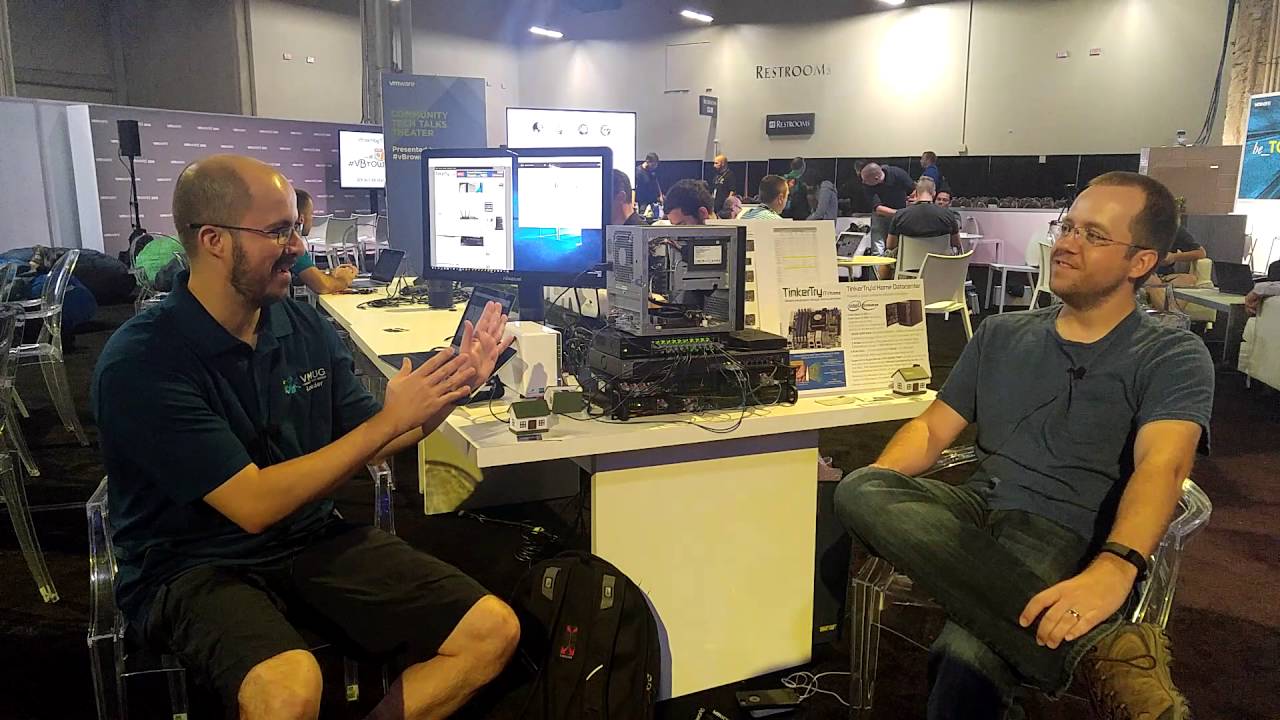So Matt, you’ve made a big impact on the community in a short time, congrats, but tell us a bit about yourself?
Thanks for that compliment 🙂 I’m an IT Manager by day at an SMB in the Kitchener-Waterloo region, in Canada. I do all the typical managerial stuff like budgets, handling vendor contracts, personnel, etc. But, I also try to stay somewhat technical. I still find myself routinely tinkering around in vSphere, maybe some networking, or just looking at things from a higher level (e.g. reviewing backup and disaster recovery plans).
Outside of my day job, I’m also a first-time vExpert for 2016, a Veeam Vanguard, and I run my own local Veeam User Group. I’m somewhat active on Twitter (@MattThatITGuy), and when 140 characters aren’t enough, you can find a selection of my ramblings at
42u.ca.
What is the biggest challenge you have in your job day to day at the moment?
Honestly, the biggest challenge is staying focused. That’s not to say that I am bored, or that I have trouble concentrating. Rather, the issue tends to come in the form of interruptions. I mentioned that I work at an SMB, and as far as IT goes, it is just me and a Sys Admin. So there isn’t a big headcount, nor do we have someone dedicated to help desk duties. On top of that, I have been at the same place for quite a few years now, so folks are just used to coming to me for help. So, I might be very deep into something like a SQL Server migration, and the next thing I know I am getting a phone call, or maybe a pop-in from someone because they can’t remember their Outlook password.

Ultimately, I am responsible for the IT systems, and by extension making sure that our users can use those systems. With that in mind, I’ll always gladly help folks out, but my work definitely does suffer for it at times. If I find myself really needing to get something done, I’ll usually work from home. Even though I might be alone at home during the day, I’ll still pop on my headphones and listen to some music. Something else that I will do is just use one monitor – I find this helps me focus as I won’t have multiple windows open fighting for my attention.
How do you expect your job role to change in the next 5 years?
I foresee a lot more outsourcing. Right now we handle a lot of the ‘heavy lifting’ internally. This includes things such as racking and provisioning servers, implementing software, etc. As our workload grows, and as cloud service offerings mature, I see more and more pieces being outsourced. Email is a great example – we have been on some form of hosted Exchange for just under a decade (currently Office 365). If we were to bring that in-house, we would not be able to provide the same level of service without incurring large costs (capital costs and increased headcount).
I’ve started moving to this model more and more. Even areas like printers. Most of our printers are under a service contract now, which basically means anytime we have an issue (smears, worn out rollers, etc.), it’s taken care of in short order. Cost-wise, it is very close, possibly cheaper than what we were paying before. But, the big benefit I get is I don’t need to worry about that stuff anymore. We’ve had instances where printers are not printing clearly and we debate putting in a new maintenance kit. That’s like a $200 decision – not huge money, but it does suck when that doesn’t solve the issue. With a service contract, I don’t need to worry about that – I just place the service call and the problem is magically fixed for me within a few hours.
What’s the costliest mistake you’ve made in your career?
I’ve been very fortunate in that I have not directly caused significant amounts of damage, and I hope that streak continues going forward. However, one of the costlier mistakes that I made was early on in my career. To make a long story short, I was tasked with finding a better antispam solution (this was early 2000s). Me being bright eyed and bushy-tailed, jumped on the task and quickly found SpamAssassin, but it required knowledge that I did not possess to. I spent weeks trying to get this working, all the while getting nowhere, in effect wasting my time. When my stress level hit maximum, I presented an alternative to my manager, which was an up-to-date license for a mail server that came in at about $500. He immediately said let’s go with that. After that, I realized that the ‘free’ SpamAssassin solution ended up costing us well over $500 in the time I had spent trying and failing to implement it.
If you’re hiring, what are you looking for in the candidate?
I won’t mention much in the way of specific skills, because that will be tailored to specific jobs. Overall though, I think you can’t go wrong with knowing Microsoft technologies due to their prevalence in enterprise IT (Windows Server, AD, SQL Server, PowerShell / scripting, etc.). Along with that, knowing some cloud technologies (Azure, AWS, or Google) is a smart move. Soft skills are important too – things like knowing how to deal with people (assessing situations, stress, etc.) go a long way. Similarly, being able to work on your own is critical; this might be taking initiative or knowing how to troubleshoot. I don’t mind helping and guiding people, but I don’t want to be their parent.
As far as soft skills, I would want a person who has a passion for this stuff, and I want to see that passion during the interview process. Working in IT can be a very thankless job, and I’ve worked with a lot of folks who just did it for a pay cheque. That’s not to say that they didn’t have the knowledge, but they tended to give the bare minimum. On the other hand, if you have someone who has a passion for this stuff, you’ll likely see better results. I’m not talking about folks working longer hours, but these are the folks who are always looking to make improvements.
You were invited to tech field day recently, how important have events like this been in your IT career and growing yourself?
Tech Field Day was an absolute blast. Stephen Foskett and the rest of the Gestalt IT crew do an amazing job, and as a delegate, I was completely blown away by the experience. The event doesn’t directly tie into anything I do at work, so it was taken as vacation time, but I gained so much value from it that I have taken back to the office. First off, you get some real quality time with some seriously smart folks from the vendor side. A lot of the time you’ll find yourself talking to folks like founders, CEOs, etc. At the same time, you might find yourself talking to someone who invented the Sun Microsystems Sun Ray (as was the case at TFD12). But in addition to these crazy smart folks, you get to spend a lot of time with your peers.
To expand on that point a b

it, when I attended my first VMWorld in 2015, it left a huge impression on me. I went there to learn more about VMware as we had done some fairly big (for us) upgrades at work. But I quickly found that a lot, if not most of the value from attending these types of events is from peer networking. Talking and networking with peers is a very difficult thing to gauge as far as having some sort of monetary value. On the flip side, through folks that I have met specifically at these events, I have been able to either solve some tough problems or get very quick help. So although it might cost $X to attend, the value gained isn’t always apparent on paper.
What have been the successes and failures of your blog site so far?
Well, it has definitely taken off compared to last year. In 2015, I had 24 posts published. For 2016, I’ll be something just North of 60. My traffic has definitely more than tripled, though 🙂 So, as far as successes, I think one of the coolest things is seeing my posts referenced. This might be someone tweeting it out, or maybe posted on a forum somewhere. One of the first comments I received on the blog was a pingback to a forum where someone was complaining about an error message in Veeam. It turns out that they found my post just before quitting time on a Friday, and it completely resolved their issue. That was cool.
As for failures, from a technical stance, I’ve been having issues. Things like 404s when previewing posts, or HTTP errors when uploading pictures. Annoying little things like that. I’m not ready to dump my hosting provider yet, but it is something that I’ll need to get figured out. A few months ago, I just kind of tweeted something out about it and the next thing I know, I had a slew of vCommuntiy folks offering tips and advice. It was so awesome to see everyone chiming in to help and give their $.02. Anthony Spiteri actually wrote a post on his blog about, and incidentally, I pulled some good tips from there. (
http://anthonyspiteri.net/the-anatomy-of-a-vblog-building-a-blogging-platform/). It was quite meta in hindsight.

How do you find keeping up with producing content, and what drives you to keep going?
This is definitely a challenge. I recently completed the vDM30in30 challenge, and somehow, I managed to get 30 posts out. Going into it, I wanted to try and keep some level of quality, so I made sure that my posts were at least 500 words. I felt that I kept the content mostly on topic, and the traffic was steady over the month, which seems to confirm that. As for what to write about? A common theme is something that I am working on or something that I did at work. A good example would be a PowerShell script that I posted a few weeks ago. It was a basic ’employee termination’ script that disables accounts, moves it to a different OU, and does some stuff in Office 365. Honestly, I knew I needed to do this at work and I couldn’t be bothered to log into all those servers or web pages to do it. I took about 20 minutes and scripted it. Then I thought that others might find a use for it, so I posted it.
Another good source is from my Veeam User Group, or even just chatting with folks at conferences. For example, a conversation I had at a vForum with a Veeam user who wasn’t fully aware that you could do restores from replicas. He seemed intrigued by the idea, and

I thought that others may not be aware of the functionality. That was another post that seemed to get a lot of attention. At the end of the day, I’ve come to realize that people are always learning, whether it is a new product or technology, or maybe they are just getting started in IT. Either way, some of these ‘basic’ tasks can be very useful for folks. Overall, I would say some of my most popular posts are ones that I thought would almost be a ‘throw away’ post.
As for what drives me to keep going? Two things: I find that I digest information better if I write. As I am writing it, I usually think about it, and this is where I start to find the gaps. I take those gaps, read up on them until I understand it, and continue along. The second thing: I like to help people – I always have. This is a way for me to help folks who I would likely never see in person. That being said, if you do see me in person and ask for help, I do expect you to actually want to learn, not just look for the answer – this goes hand in hand with my answer regarding candidates above.
What tips can you provide to anyone blogging or thinking about starting?
Just do it – just start writing. Your first few posts might feel clunky to you, and that’s OK. Matt Simmons (StandaloneSA –
http://t.co/1vGz2Ey4AY) wrote a great piece on this idea and it really hit home to me. But the point is, don’t worry about it, just keep going. Over time you’ll develop your own stride – patterns will start to emerge as far as when you work best, what topics you write about, and what tools you use to write. Don’t worry if you aren’t sure what your ‘voice’ should sound like – I am still figuring a lot of that out. If you look at some of my older posts, they are a mixed bag of all sorts of stuff.
Also, don’t be shy – share your content. Twitter has been huge for me and my personal growth, so if you aren’t on there, get on there. When you write a new post, tweet it out, and retweet it a few times, just don’t go crazy with it. Eventually, you’ll get some traction. Other places to consider posting/sharing your posts are Reddit and LinkedIn. Also, don’t fear criticism, but be sure to weed out the trolls. We all suck at different things, but if we listen to the criticism and improve ourselves, then we are better off.
Idea’s for a good christmas gift for an IT person?
Being removed from the on-call rotation.
Ha, yes we’d all love to turn off the phone and walk away from providing support, even from the family as they get new gadgets…
Aside from that, something for the homelab. Without a budget, this could be anything from a used Cisco switch to an Intel NUC, or maybe one of those real fancy SuperMicro homelab combos (
https://tinkertry.com/superservers). But, as I mentioned above, if someone has a passion for IT they will enjoy tinkering with this stuff in their spare time.
Finally, Any tips for people getting started in IT, or looking for a focus/direction?
Some advice: most of us start off in a help desk type of role. It can suck, but it goes with the territory. I encourage you to embrace it and own those problems. Yes, you might get 9 calls a day from people who don’t remember their passwords – don’t just be smug about it. Add a little conversation into it, something like ‘oh, sorry to hear that. I know that we quite often see issues with Caps Lock or Num Lock not being turned on, or maybe it is on. Did you want to double-check that quickly? If that doesn’t do the trick, I’ll reset your password for you’. Become that person who is known to have happy, or at least content customers.
You have to keep something in mind: if folks are reaching out to you, chances are they need help. They probably aren’t calling just to say ‘hi’, and chances are they have tried a bunch of things and are just frustrated now. Think about how you would like to be dealt with if you were in their situation. Also, know when you should take that frustration personally and when not to. In a lot of cases, things are out of your control, so let it go. But if someone is getting frustrated because of something you are doing (or not doing), take note of it. Don’t dwell on it, but ask yourself if you could do something different.
 it, when I attended my first VMWorld in 2015, it left a huge impression on me. I went there to learn more about VMware as we had done some fairly big (for us) upgrades at work. But I quickly found that a lot, if not most of the value from attending these types of events is from peer networking. Talking and networking with peers is a very difficult thing to gauge as far as having some sort of monetary value. On the flip side, through folks that I have met specifically at these events, I have been able to either solve some tough problems or get very quick help. So although it might cost $X to attend, the value gained isn’t always apparent on paper.
it, when I attended my first VMWorld in 2015, it left a huge impression on me. I went there to learn more about VMware as we had done some fairly big (for us) upgrades at work. But I quickly found that a lot, if not most of the value from attending these types of events is from peer networking. Talking and networking with peers is a very difficult thing to gauge as far as having some sort of monetary value. On the flip side, through folks that I have met specifically at these events, I have been able to either solve some tough problems or get very quick help. So although it might cost $X to attend, the value gained isn’t always apparent on paper. I thought that others may not be aware of the functionality. That was another post that seemed to get a lot of attention. At the end of the day, I’ve come to realize that people are always learning, whether it is a new product or technology, or maybe they are just getting started in IT. Either way, some of these ‘basic’ tasks can be very useful for folks. Overall, I would say some of my most popular posts are ones that I thought would almost be a ‘throw away’ post.
I thought that others may not be aware of the functionality. That was another post that seemed to get a lot of attention. At the end of the day, I’ve come to realize that people are always learning, whether it is a new product or technology, or maybe they are just getting started in IT. Either way, some of these ‘basic’ tasks can be very useful for folks. Overall, I would say some of my most popular posts are ones that I thought would almost be a ‘throw away’ post.


